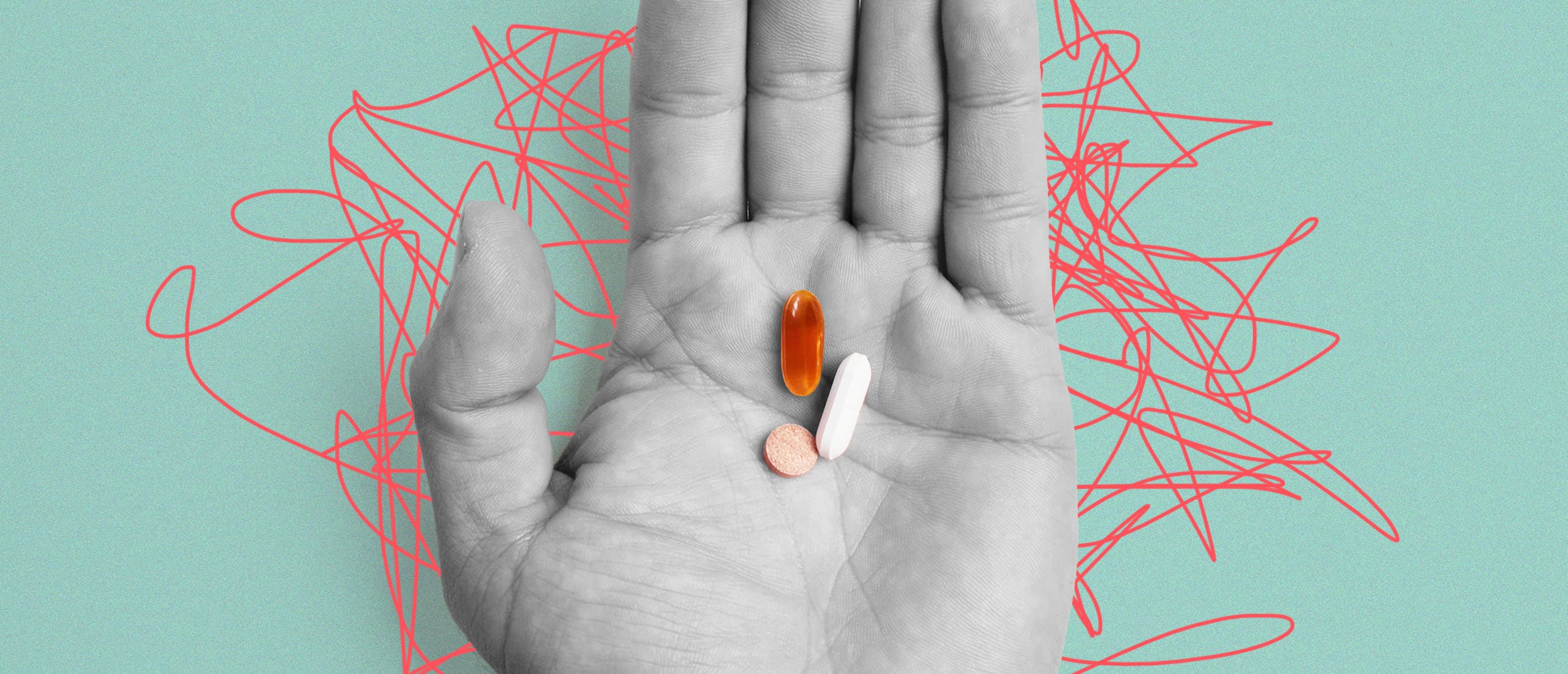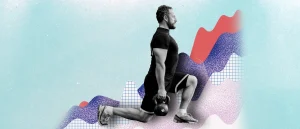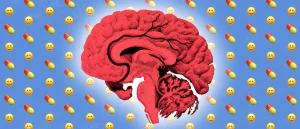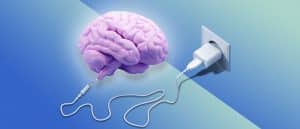Can You Pop Vitamins for Anxiety?
Biting your nails over a big work project? We’ve all had anxious moments. But when worry, tension, and fear are so intense that they keep you from, say, sleeping, you may actually be experiencing anxiety.
And you’re not alone: More than 30% of American adults develop an anxiety disorder at some point, according to the American Psychiatric Association. The good news: in most cases, anxiety is highly treatable—and part of that treatment may include vitamins.
“Anxiety” is sort of a catch-all term. It covers everything from generalized anxiety disorder with its paralyzing and persistent worries, to social anxiety, phobias, and panic disorder, which is characterized by symptoms like a racing heart, sweating like you just ran a marathon, chest pain, nausea, and shortness of breath.
A variety of factors can lead to these types of anxiety, such as brain chemistry, genetic predisposition, life events, and personality. Yet some research—including a 2023 review published in Dietetics—points to another factor: diet (1).
Researchers say that a healthy, nutrient-rich diet may reduce the risk of developing anxiety while one full of fried foods, sugar, refined grains, and alcohol may increase your odds. (Maybe another reason to cut back on the booze.)
Here’s more on how nutrients can relate to anxiety, and which vitamins can give your mental health an assist.
Vitamins for Anxiety
Vitamins, minerals, and other supplements ease anxiety in a variety of ways. Some increase or regulate levels of two of the “good mood” neurotransmitters: serotonin and dopamine. In fact, research shows loss of the serotonin receptor 4 in the brain’s hippocampus may lead to an elevation of anxiety (2). Similarly, dopamine also modulates anxiety (3).
Here’s how they shake out:
Vitamin B-Complex
“B vitamins in particular play a role in reducing depression, anxiety, and insomnia,” says registered dietitian nutritionist Yelena Wheeler, MPH, RD.
And research suggests supplementing with B vitamins can help (4). Several of the eight B vitamins may play a role in mood and anxiety: B1 (thiamine), B6 (pyridoxine), and B12 (cobalamin). Additionally, Wheeler recommends B9 (folate).
Not only do these B vitamins support how the body synthesizes serotonin and dopamine, they’re also considered to be “neurotropic,” meaning they play a role in how the central and peripheral nervous systems function. They’re also related to an energy boost.
Find them in food: eggs, poultry, fish (B12 is found only in animal products); citrus fruits, leafy greens (B9); liver, tuna, salmon, prunes, chickpeas (B6); meats, fish, whole grains, beans, lentils (B1)
Magnesium
Some research suggests magnesium may improve anxiety—and that a magnesium deficiency may cause anxiety symptoms (5, 6). The mineral may also improve sleep quality, which certainly can affect your mood. Adult men should get between 400 and 420 mg per day.
Lana Butner, ND, a New York-based board-certified naturopathic doctor recommends dark leafy greens to get your magnesium dose: “These veggies help improve levels of serotonin,” she says. “They are also excellent for inflammation and gut health.”
Find it in food: kale, spinach, pumpkin seeds, chia seeds, nuts, beans
Vitamin C
Vitamin C is an antioxidant that supports adrenal function, which is involved in the body’s stress response. Some research suggests supplementing with vitamin C could help reduce the symptoms of anxiety (7).
Boosting your antioxidant intake in general can create a host of health benefits, including improving both anxiety and depression, according to a 2023 meta-analysis of randomized controlled trials (8).
Butner recommends chowing down on dark berries to get your antioxidants. “They contain powerful antioxidants, vitamins, and minerals, which can help decrease inflammation and improve cognitive function,” she says.
Find it in foods: citrus fruit, strawberries, blackberries, blueberries, raspberries
Probiotics
“We now know that the gut-brain connection is much more complex than we ever thought, so it’s crucial to repopulate the good bacteria,” Butner says.
Although research is limited, some studies suggest taking probiotics may be able to help with anxiety and depression (9).
Prebiotic foods can also help you digest probiotic foods, according to Butner.
Find them in food: unpasteurized sauerkraut, unpasteurized kombucha (probiotics); garlic, onions, asparagus (prebiotics)
Omega-3 fatty acids
“Known as the ‘good’ fats, these powerful compounds increase serotonin and dopamine levels,” Butner says. “They are also anti-inflammatory and are critical for maintaining the health, fluidity, and permeability of cellular membranes, which is critical for healthy aging.”
If you’re taking a fish-oil supplement, look for one that contains mostly DHA, as it’s the fatty acid that’s most indicated for brain support, Butner says.
Find them in food: wild-caught salmon or tuna (DHA/EPA); chia seeds, flax seeds, walnuts, pumpkin seeds (ALA)
L-theanine
L-theanine is an amino acid found in tea that has been shown to relieve stress and improve anxiety symptoms. EEG research has shown it increases alpha brain wave activity, which induces relaxation without drowsiness.
A small 2019 study showed a four-week regimen of L-theanine improved sleep, depression, and anxiety (10). Other research has found mixed results in its efficacy (11).
Find it in food: green or black tea
Ashwagandha
Ashwagandha is an herb traditionally used in Ayurvedic medicine, though it’s gone mainstream more recently. It’s an adaptogen, meaning it helps your body cope with stress.
Although many of the studies were small, research has found the herb may help reduce anxiety and stress by moderating the hypothalamus-pituitary-adrenal axis (HPA). The HPA responds to stress by releasing the hormone cortisol, which can increase anxiety (12).
Ashwagandha is not found in food but can be consumed as a supplement. There’s not a recommended daily dosage of ashwagandha, however.
Andrew Huberman has mentioned in his podcasts to not take ashwagandha for more than one month at a time—and then taking two to four weeks off before hitting it up for another round. As with all supplements, check with your doctor before taking them.
Managing Your Anxiety
Taking vitamins for anxiety could help, yet your best course of action would involve consulting with your doctor and possibly therapy or prescription medication. There are everyday ways to keep stress and mild anxiety at bay, however, according to the Anxiety and Depression Association of America. Some include:
- Relaxing with breathing exercises
- Prioritizing sleep
- Exercising daily, getting in at least 150 minutes of moderate-intensity or 75 minutes of high-intensity activity per week
- Limiting caffeine and alcohol consumption
References
1. Totten, M., et al., (2023). Trace Minerals and Anxiety: A Review of Zinc, Copper, Iron, and Selenium
2. Karoyal, M., et al., (2021). Serotonin receptor 4 in the hippocampus modulates mood and anxiety
3. Zarrindast, MR., and Khakpai, F., (2015). The Modulatory Role of Dopamine in Anxiety-like Behavior
4. Calderon-Ospina, C. and Nava-Mesa, M., (2019). B Vitamins in the nervous system: Current knowledge of the biochemical modes of action and synergies of thiamine, pyridoxine, and cobalamin
5. Boyle, N., et al., (2017). The Effects of Magnesium Supplementation on Subjective Anxiety and Stress—A Systematic Review
6. Pickering, G., et al., (2020). Magnesium Status and Stress: The Vicious Circle Concept Revisited
7. Sim, M. et al., (2022). Vitamin C supplementation promotes mental vitality in healthy young adults: results from a cross-sectional analysis and a randomized, double-blind, placebo-controlled trial
8. Wang, H., et al., (2023). Protective role of antioxidant supplementation for depression and anxiety: A meta-analysis of randomized clinical trials
9. Cui Liu, LC., et al., (2020). Effects of Probiotics on Depressive or Anxiety Variables in Healthy Participants Under Stress Conditions or With a Depressive or Anxiety Diagnosis: A Meta-Analysis of Randomized Controlled Trials
10. Hidese, S., et al., (2019). Effects of L-Theanine Administration on Stress-Related Symptoms and Cognitive Functions in Healthy Adults: A Randomized Controlled Trial
11. Wang, L. et al., (2022). How does the tea L-theanine buffer stress and anxiety
12. Hinds, J. and Sanchez, E., (2022). The Role of the Hypothalamus–Pituitary–Adrenal (HPA) Axis in Test-Induced Anxiety: Assessments, Physiological Responses, and Molecular Details














